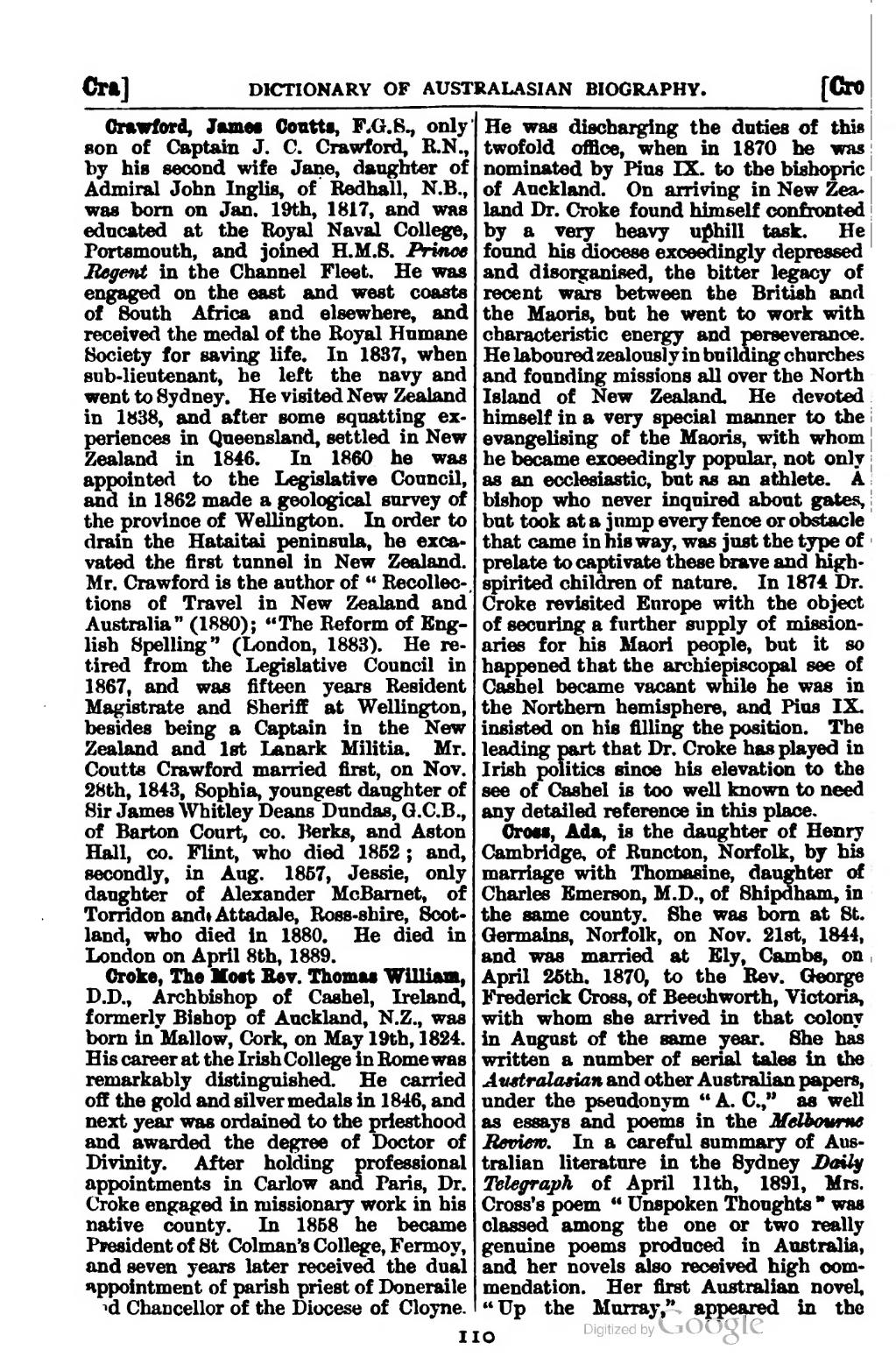Crawford, James Coutts, F.G.S., only son of Captain J. C. Crawford, R.N., by his second wife Jane, daughter of Admiral John Inglis, of Redhall, N.B., was born on Jan. 19th, 1817, and was educated at the Royal Naval College, Portsmouth, and joined H.M.S. Prince Regent in the Channel Fleet. He was engaged on the east and west coasts of South Africa and elsewhere, and received the medal of the Royal Humane Society for saving life. In 1837, when sub-lieutenant, he left the navy and went to Sydney. He visited New Zealand in 1838, and after some squatting experiences in Queensland, settled in New Zealand in 1846. In 1860 he was appointed to the Legislative Council, and in 1862 made a geological survey of the province of Wellington. In order to drain the Hataitai peninsula, he excavated the first tunnel in New Zealand. Mr. Crawford is the author of "Recollections of Travel in New Zealand and Australia" (1880); "The Reform of English Spelling" (London, 1883). He retired from the Legislative Council in 1867, and was fifteen years Resident Magistrate and Sheriff at Wellington, besides being a Captain in the New Zealand and 1st Lanark Militia. Mr. Coutts Crawford married first, on Nov. 28th, 1843, Sophia, youngest daughter of Sir James Whitley Deans Dundas, G.C.B., of Barton Court, co. Berks, and Aston Hall, co. Flint, who died 1852; and, secondly, in Aug. 1857, Jessie, only daughter of Alexander McBarnet, of Torridon and Attadale, Ross-shire, Scotland, who died in 1880. He died in London on April 8th, 1889.
Croke, The Most Rev. Thomas William, D.D., Archbishop of Cashel, Ireland, formerly Bishop of Auckland, N.Z., was born in Mallow, Cork, on May 19th, 1824. His career at the Irish College in Rome was remarkably distinguished. He carried off the gold and silver medals in 1846, and next year was ordained to the priesthood and awarded the degree of Doctor of Divinity. After holding professional appointments in Carlow and Paris, Dr. Croke engaged in missionary work in his native county. In 1858 he became President of St Colman's College, Fermoy, and seven years later received the dual appointment of parish priest of Doneraile and Chancellor of the Diocese of Cloyne. He was discharging the duties of this twofold office, when in 1870 he was nominated by Pius IX. to the bishopric of Auckland. On arriving in New Zealand Dr. Croke found himself confronted by a very heavy uphill task. He found his diocese exceedingly depressed and disorganised, the bitter legacy of recent wars between the British and the Maoris, but he went to work with characteristic energy and perseverance. He laboured zealously in building churches and founding missions all over the North Island of New Zealand. He devoted himself in a very special manner to the evangelising of the Maoris, with whom he became exceedingly popular, not only as an ecclesiastic, but as an athlete. A bishop who never inquired about gates, but took at a jump every fence or obstacle that came in his way, was just the type of prelate to captivate these brave and high-spirited children of nature. In 1874 Dr. Croke revisited Europe with the object of securing a further supply of missionaries for his Maori people, but it so happened that the archiepiscopal see of Cashel became vacant while he was in the Northern hemisphere, and Pius IX. insisted on his filling the position. The leading part that Dr. Croke has played in Irish politics since his elevation to the see of Cashel is too well known to need any detailed reference in this place.
Cross, Ada, is the daughter of Henry Cambridge, of Runcton, Norfolk, by his marriage with Thomasine, daughter of Charles Emerson, M.D., of Shipdham, in the same county. She was born at St. Germains, Norfolk, on Nov. 21st, 1844, and was married at Ely, Cambs, on April 25th. 1870, to the Rev. George Frederick Cross, of Beechworth, Victoria, with whom she arrived in that colony in August of the same year. She has written a number of serial tales in the Australasian and other Australian papers, under the pseudonym "A. C.," as well as essays and poems in the Melbourne Review. In a careful summary of Australian literature in the Sydney Daily Telegraph of April 11th, 1891, Mrs. Cross's poem "Unspoken Thoughts" was classed among the one or two really genuine poems produced in Australia, and her novels also received high commendation. Her first Australian novel, "Up the Murray," appeared in the
110
